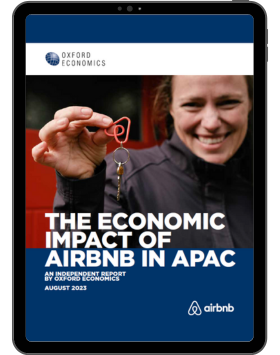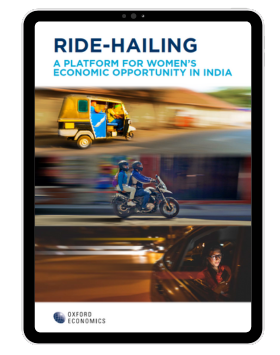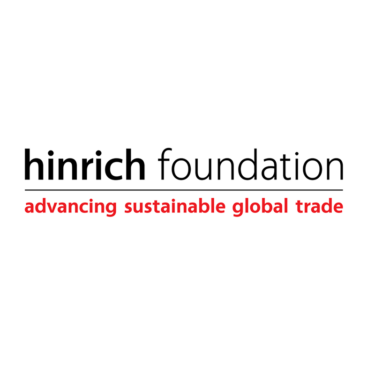Using economics to achieve more impactful policy engagement in Asia
Unlock the power of economics to build credibility, shape policy and strengthen relationships with government stakeholders
Talk to us Talk to us
Asia’s policy landscape is evolving fast. Reputational challenges, regulatory shifts and new policy agendas are putting pressure on international businesses to defend their markets and demonstrate their value.
At Oxford Economics, we help government affairs leaders engage more effectively with their key stakeholders by grounding their advocacy in credible, independent economic analysis. Our insights help you build trust, shape policy dialogue and deliver messages that resonate with decision-makers.
Economics provides crucial insights into the drivers behind significant policy decisions, and illuminates the potential repercussions of various policy scenarios. In collaboration with government affairs leaders and industry experts, we bring fresh perspectives to the table, helping our clients to make their voice count in policy engagements.
Discover how Oxford Economics can assist you in using economic insights to elevate your dialogue with government stakeholders, or learn about our success stories by clicking the button below.
Talk to usHow can we help you

Crafting a data-driven narrative that builds trust
We use clear, compelling economic analysis to help clients demonstrate their value to local and national economies.
As global leaders in socio-economic impact analysis, we work with organisations to quantify their contribution to GDP, job creation, tax revenues and broader societal and environmental goals – even for complex or non-traditional business models. This means helping our clients deliver compelling, evidence-based value they bring to local and national economies.
Example, Our partnership with Airbnb in APAC since 2019 has helped the company demonstrate its local economic contributions, providing a consistent advocacy narrative that has increasingly resonated with government stakeholders. Our impact analysis has provided the basis for a more constructive dialogue with policymakers at local and national levels, placing the platform’s positive contribution at the heart of the conversation.
Read Airbnb Report
Shifting policy dialogue from detail to strategy
We help clients move beyond tactical lobbying to shape broader, more strategic policy discussions. By demonstrating the socio-economic impact of different policy pathways with robust and objective analysis, we enable our clients to reframe conversations and build credibility. This is particularly effective when our clients’ policy dialogue is at risk of gettings bogged down in granular disagreements over policy detail. Our analysis helps present a broader perspective, and a more constructive foundation for policy discussion.
Example, For Uber in South Asia, our research showed how ride-hailing supports women’s economic empowerment. Through empirical modelling and real-world case studies, our analysis helped shift public narratives and foster constructive engagements between industry and government on urban transport policy. Our launch event was attended by government ministers, policy stakeholders, and the press, placing Uber at the heart of a positive dialogue about the potential contribution of technology to social causes.
Read Uber Report
Influencing senior policy stakeholders with strategic insight
We help our clients move from reactive messaging to proactive engagement by placing business issues in a broader economic and societal context.
Example: Our work with Food Industry Asia, equipped the trade association and its members with robust, independent analysis on issues like climate change, skills gaps and economic recovery – as they pertained to the agri-food sector. This enabled them to engage in a richer dialogue with government counterparts and to create space for more productive discussions, which helped establish trust and influence with key counterparts for more specific policy discussions ahead.
Read FIA Report
Interne Entscheidungsfindung
Mit unseren Expertenteams und bewährten Modellen können wir die Auswirkungen staatlicher Maßnahmen auf Organisationen, Branchen und Volkswirtschaften – von der hyperlokalen bis zur globalen Ebene – genau messen. In Kombination mit unseren maßgeschneiderten Tools zur Risikoüberwachung und Szenarioanalyse sind wir ein unschätzbarer Partner für Unternehmen, die sich mit zahlreichen Vorschriften in verschiedenen Regionen auseinandersetzen müssen.
Wir identifizieren nicht nur die Risiken, sondern versetzen Unternehmen auch in die Lage, ihre Geschäftsstrategien und langfristigen Planungen an den zu erwartenden politischen Veränderungen auszurichten. So können sie sicherstellen, dass sie gut aufgestellt sind, um neue Vorschriften einzuhalten und sich bietende Chancen durch fundierte Entscheidungen über Investitionen, Innovationen und Geschäftsentwicklung zu nutzen.
Gemeinsam mit einem Kunden haben wir ein Modell zur Identifizierung, Priorisierung und Überwachung von Risikosignalen entwickelt, um eine Reihe geopolitischer, wirtschaftlicher, sozialer, technologischer, ökonomischer und rechtlicher Risiken zu bewerten.
Latest Blog

Post
Helping Us Help Them: Lessons from Five Years Consulting with Asia-based Clients
This “winter” marks my fifth year in Asia, after moving from London to Singapore to help build Oxford Economics’ consulting business in the Asian market.
Find Out More
Post
Using economics to improve business dialogue with governments in Asia
In Oxford Economics’ Singapore office, overlooking the historic Singapore river, we count as our neighbours the Asian headquarters of most the world’s major multinational companies.
Find Out More
“We were drawn to working with Oxford Economics for its solid reputation and the strength of its research, and we’ve been particularly impressed with your ability to present this to governments and the media – it’s the reason we’d look for future opportunities to work together.”

“Oxford Economics has a built-in edge in econometric analysis that has been tremendously helpful in allowing our audience to size up and understand complex subjects. As a foundation that works to advance sustainable global trade, Oxford Economics has helped us address and carry key messages from our mission on some of the most important challenges in economic and foreign policies confronting the world today. The team’s ability to accommodate a broad variety of different subjects under our foundation’s remit has helped us create bespoke thought leadership, however unconventional the angle might be. They work against tight deadlines, are willing to embrace creative solutions, and I have been pleased to have worked closely together with them to deliver some of our most successful projects.”

“FIA has been working with Oxford Economics for a number of years and we are ‘repeat customers’ due to the quality of the work priced at the rate charged. We would continue to work with Oxford Economics in critical areas related to the food and agriculture industry, in which an economics lens needs to be applied. They are also a good team to work with, listen to the client and are not afraid to push back and offer advice on what works in terms of their extensive experience.”

“Working with Oxford Economics has been a pleasure. Their rigorous analysis and deep insights have been instrumental in highlighting the economic impact of premium F&B experiences in the Asia-Pacific region. The quality of their work, professionalism, and collaborative spirit have greatly enriched our initiatives, and we look forward to continued collaborations together.”
Meet Our Experts

James Lambert
Director of Economic Consulting, Asia

James Lambert
Director of Economic Consulting, Asia
Singapore
James is the Director of Oxford Economics’ economic consulting services in Asia.
James moved to this role from Oxford Economics’ London office, where he headed up a team dedicated to exploring the economic impact of technology. He delivered high profile studies on the growth of the digital economy, the impact of automation and the implications for the labour market.
Prior to joining Oxford Economics, James spent over six years in the Government Economics Service. He worked in economics teams of the Cabinet Office, the Foreign and Commonwealth Office and the Department for Transport. There, he gained experience in microeconomic analysis and impact assessment as well as international macroeconomics, economic risk analysis and energy security. In the FCO, James spent three years working on economic issues in East and South East Asia. He also previously worked for the International Labour Organization.

Federico Chirico
Head of Consulting Business Development – Asia

Federico Chirico
Head of Consulting Business Development – Asia
Singapore
Federico Chirico is a business professional with over 15 years of experience in thought leadership, strategy consulting, and sales. He currently serves as the Head of Business Development for Asia at Oxford Economics, where he leads the firm’s efforts in consulting across various sectors.
Prior to joining Oxford Economics, Federico held various positions at The Economist Group and Thomson Reuters, where he gained extensive experience in EMEA and South East Asia. He holds a Bachelor’s degree in Business Administration from the University of Genova, a Master’s degree from the University of Leicester, and a Postgraduate Diploma from Stanford University. His areas of expertise include technology, sustainability, and healthcare.

Thang Nguyen-Quoc
Associate Director, Macro Consulting

Thang Nguyen-Quoc
Associate Director, Macro Consulting
Ho Chi Minh City, Vietnam
Thang Nguyen-Quoc, Ph.D. leads Oxford Economics Asia’s Macro consulting team in Singapore. In this capacity, he supports clients with carrying out bespoke forecast and scenario modelling, as well as thought-leadership reports on trade and green transition. His core expertise is in policy analysis related to international trade and investment. His doctoral thesis evaluated the impacts of digitalization, protectionism and regionalism on the trade patterns of developing countries, using a range of econometric techniques.
Prior to joining OE in 2022, Thang spent a decade delivering flagship economic reports on Asian and African economies at the Organisation for Economic Cooperation and Development (OECD) in Paris. He also worked in various roles at the World Bank, National Academy of Social Sciences (US), and Vietnam Commercial Bank. He got a Ph.D. in International Economics from University Paris-Dauphine, M.Sc. from Barcelona School of Economics and B.A. from Ohio Wesleyan University.

Bali Kaur Sodhi
Lead Economist, Economic Consulting, Asia

Bali Kaur Sodhi
Lead Economist, Economic Consulting, Asia
Singapore
Senior Economist in the Economic Consulting Division in Asia, managing research and analytical projects on a range of topics, each requiring bespoke economic tools.

Liam Cordingley
Lead Economist, Economic Consulting, Asia

Liam Cordingley
Lead Economist, Economic Consulting, Asia
Singapore
Lead Economist, Economic Consulting, Asia

Louise Loo
Head of Asia Economics

Louise Loo
Head of Asia Economics
Singapore
Louise Loo is the Head of Asia Economics at Oxford Economics. She leads the firm’s macroeconomic research and forecasting efforts on Greater China.
Prior to joining Oxford Economics, she was a senior economist at Morgan Stanley and Goldman Sachs. At Goldman Sachs, she was also a long-term advisor to China Ministry of Finance and the China-based Asian Infrastructure Investment Bank (AIIB) with regards to their sovereign credit ratings.
Louise is a regular contributor to various international financial news outlets and has earned Economics and public policy degrees with Sheffield University and Columbia University.

Betty Wang
Lead Economist

Betty Wang
Lead Economist
Singapore
Betty joined Oxford Economics in January 2024 as Lead Economist covering Greater China and regional trends in Asia, based in Singapore.
Before joining Oxford Economics, Betty served as a Senior China Economist at Australia and New Zealand Banking Group Ltd, based in Hong Kong. She has built a strong reputation among corporate and financial institutional clients, with her China research widely cited by local and international media. Beyond her Greater China coverage, Betty took initiatives and expanded her research focus to ESG and sustainable finance, leading the team to win the best ESG research award in Australia. Betty started her career at Standard Chartered Bank in 2008, where she worked as a Northeast Asia Economist.






